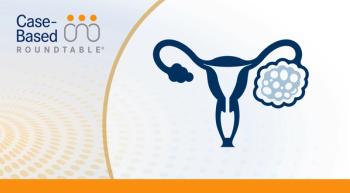
Dostarlimab in Combination with Carboplatin and Paclitaxel for Treatment of dMMR Endometrial Cancer
Dr Matthew A. Powell reviews the study design and key endpoints of the RUBY trial in dMMR endometrial cancer and explains the potential clinical implications of the data.
Episodes in this series

Matthew A. Powell, MD: We have very exciting advances within endometrial cancer this year. This March, [findings from] the RUBY trial were presented and simultaneously published within the New England Journal of Medicine. I had the honor of being the senior author on that paper that was evaluating the addition of dostarlimab to carboplatin/paclitaxel chemotherapy for patients with advanced-stage or recurrent endometrial cancer. All types of patients were accrued to that study. It was randomized [and] placebo controlled. The key end points for this study were progression-free and overall survival. There were different patient populations enrolled, including a defective mismatch repair [dMMR] population that was stratified as part of the randomization and then the proficient population, which was a little different from [the] NRG-GY018 study; it allowed about 10% of the patients to…have the carcinosarcoma. There are quite exciting results, with a 70% improvement in progression-free and overall survival in the defective mismatch repair population with the addition of dostarlimab. [There are] very impressive hazard ratios. The overall survival data are still not yet mature; [we’re] just waiting on additional maturity. But the highly impressive P value is something that has driven this to be a big change in the standard [of] care and led to that FDA approval of dostarlimab for these patients. And it’s had a big impact on the treatment landscape for these patients with defective mismatch repair, recurrent disease, or advanced-stage disease, making this first-line treatment for these patients. Obviously, there’s a lot of debate about whether they need chemotherapy. We have some data from the PORTEC-3 study that the mismatch repair population doesn’t seem to provide much benefit, at least for earlier-stage patients for chemotherapy in the form of carboplatin/paclitaxel. And maybe that checkpoint alone is what’s appropriate for these patients. That’s still being tested. Nonetheless, the current data would suggest the combination of carboplatin/paclitaxel with dostarlimab makes sense for these patients. When we think about sequencing for patients, using carboplatin/paclitaxel with a checkpoint inhibitor seems to be the appropriate frontline treatment at this time. When we look at chemotherapy toxicity, as these patients suffer toxicity, dropping 1 or both of the cytotoxic agents is appropriate, especially as we feel the checkpoint inhibition may be the most important part of their therapy.
Transcript is AI generated for clarity and readability.


















